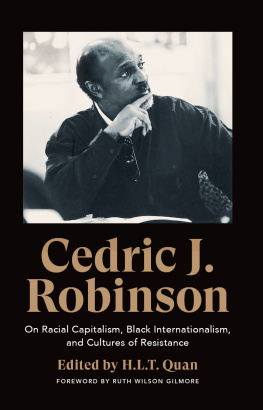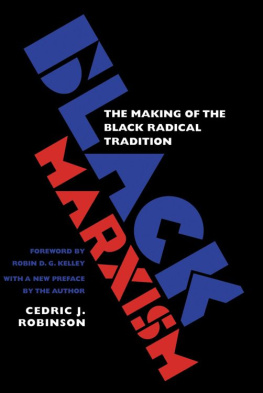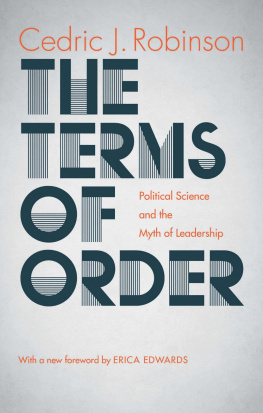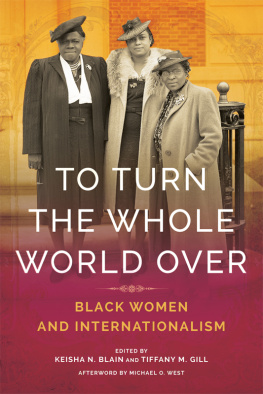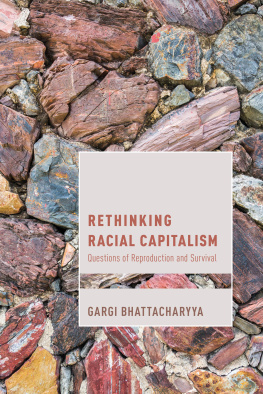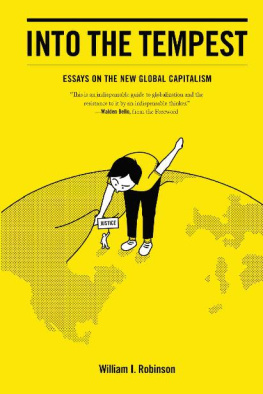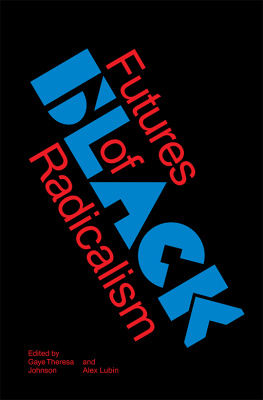Cedric J. Robinson - On racial capitalism, Black internationalism, and cultures of resistance
Here you can read online Cedric J. Robinson - On racial capitalism, Black internationalism, and cultures of resistance full text of the book (entire story) in english for free. Download pdf and epub, get meaning, cover and reviews about this ebook. year: 2019, publisher: Pluto Press, genre: Politics. Description of the work, (preface) as well as reviews are available. Best literature library LitArk.com created for fans of good reading and offers a wide selection of genres:
Romance novel
Science fiction
Adventure
Detective
Science
History
Home and family
Prose
Art
Politics
Computer
Non-fiction
Religion
Business
Children
Humor
Choose a favorite category and find really read worthwhile books. Enjoy immersion in the world of imagination, feel the emotions of the characters or learn something new for yourself, make an fascinating discovery.
- Book:On racial capitalism, Black internationalism, and cultures of resistance
- Author:
- Publisher:Pluto Press
- Genre:
- Year:2019
- Rating:5 / 5
- Favourites:Add to favourites
- Your mark:
- 100
- 1
- 2
- 3
- 4
- 5
On racial capitalism, Black internationalism, and cultures of resistance: summary, description and annotation
We offer to read an annotation, description, summary or preface (depends on what the author of the book "On racial capitalism, Black internationalism, and cultures of resistance" wrote himself). If you haven't found the necessary information about the book — write in the comments, we will try to find it.
Cedric J. Robinson: author's other books
Who wrote On racial capitalism, Black internationalism, and cultures of resistance? Find out the surname, the name of the author of the book and a list of all author's works by series.
On racial capitalism, Black internationalism, and cultures of resistance — read online for free the complete book (whole text) full work
Below is the text of the book, divided by pages. System saving the place of the last page read, allows you to conveniently read the book "On racial capitalism, Black internationalism, and cultures of resistance" online for free, without having to search again every time where you left off. Put a bookmark, and you can go to the page where you finished reading at any time.
Font size:
Interval:
Bookmark:

Cedric J. Robinson
Black Critique
Series editors: Anthony Bogues and Bedour Alagraa
We live in a troubled world. The rise of authoritarianism marks the dominant current political order. The end of colonial empires did not inaugurate a more humane world; rather, the old order reasserted itself.
In opposition, throughout the twentieth century and until today, anti-racist, radical decolonization struggles attempted to create new forms of thought. Figures from Ida B. Wells to W. E. B. Du Bois and Steve Biko, from Claudia Jones to Walter Rodney and Amlcar Cabral produced work which drew from the historical experiences of Africa and the African diaspora. They drew inspiration from the Haitian revolution, radical Black abolitionist thought and practice, and other currents that marked the contours of a Black radical intellectual and political tradition.
The Black Critique series operates squarely within this tradition of ideas and political struggles. It includes books which foreground this rich and complex history. At a time when there is a deep desire for change, Black radicalism is one of the most underexplored traditions that can drive emancipatory change today. This series highlights these critical ideas from anywhere in the Black world, creating a new history of radical thought for our times.
Also available:
Moving Against the System:
The 1968 Congress of Black Writers and the Making of Global Consciousness
Edited and with an Introduction by David Austin
Red International and Black Caribbean Communists in New York City,
Mexico and the West Indies, 19191939
Margaret Stevens
A Certain Amount of Madness:
The Life, Politics and Legacies of Thomas Sankara
Edited by Amber Murrey
On Racial Capitalism, Black Internationalism, and Cultures of Resistance
Edited by H. L. T. Quan
FOREWORD BY RUTH WILSON GILMORE

First published 2019 by Pluto Press
345 Archway Road, London N6 5AA
www.plutobooks.com
Copyright the Estate of Cedric J. Robinson 2019
British Library Cataloguing in Publication Data
A catalogue record for this book is available from the British Library
ISBN 978 0 7453 4002 9 Hardback
ISBN 978 0 7453 4003 6 Paperback
ISBN 978 1 7868 0520 1 PDF eBook
ISBN 978 1 7868 0522 5 Kindle eBook
ISBN 978 1 7868 0521 8 EPUB eBook
This book is printed on paper suitable for recycling and made from fully managed and sustained forest sources. Logging, pulping and manufacturing processes are expected to conform to the environmental standards of the country of origin.
Typeset by Riverside Publishing Solutions, Salisbury, United Kingdom
Simultaneously printed in the United Kingdom and United States of America
H. L. T. Quan
When Cedric J. Robinson died in June 2016, he left behind a rich legacy of learning, teaching, and radical social inquiries, of which this collection is a part. Cedric aimed at and frequently succeeded in supplying his students and the general public with works that are generative his writings and public lectures sought to open up spaces previously unavailable and/or differently configured. In the process, he made it possible for many of us to join him in a collective journey to radicalize the academy, democratize knowledge, and redeem, in however small measures, our humanity in life and work within this precarious and unjust world order. It is thus a personal privilege for me to partake in this collective endeavor. For this privilege, a three-decade long friendship, and the countless life lessons, I am deeply indebted to Cedric and Elizabeths generosity and kindred spirit. I am further indebted to Elizabeth who shepherded this project from the earliest stages (more than twenty years ago) through the reassembling of the materials for this acknowledgement, not to mention editorial support and the gentle, persistent urgings ensuring the final publication of this collection.
Elizabeth and I are grateful to a number of individuals whose contributions were invaluable to the making of this collection. Kofi Buenor Hadjor initiated the idea of a collection of essays to compliment Cedrics books, and Africa World Press publisher Kassahun Checole expressed early enthusiasm and support for it. Stephen Ward found and shared the complete draft of the previously unpublished, David Walker and the Precepts of Black Studies. Luz Maria Cabral co-authored The Mulatta on Film: From Hollywood to the Mexican Revolution, and gave permission for its republication. Ruth Wilson Gilmore graciously agreed to write the foreword, even in difficult circumstances.
We owe special thanks to the journal, Race & Class and the Institute of Race Relations, especially Hazel Waters, Jenny Bourne, and the late A. Sivanandan for their deep engagement with Cedrics work and for making it possible for it to receive public, international airings; Sarah Suhail for research assistance, and M. A. Bortner for invaluable feedback. We are also deeply appreciative of the amazing editorial staff at Pluto Press and their dedication to seeing this project a reality, especially David Shulmans vision and patience and Paul Beanies and Robert Webbs editorial supports.
We thank the following for permissions to reprint: the Fernand Braudel Center (Binghamton University) for Notes Toward a Native Theory of History; Taylor & Francis for In Search of a Pan-African Commonwealth, Slavery, and the Platonic Origins of Anti-Democracy, Malcolm Little as a Charismatic Leader, and Race, Capitalism, and the Anti-democracy; the University of Minnesota Press for Oliver Cromwell Cox and the Historiography of the West; the Center for the Humanities (University of Southern California) for Fascism and the Intersections of Capitalism, Racialism, and Historical Consciousness; Wiley-Blackwell Publishing for Ota Benga through Geronimos Eyes: Tales of Science and Multiculturalism; Duke University Press for The Comedy of Terror; The Santa Barbara News & Review for Africa: In Hoc to History and the Banks, The Institute of Race Relations for The American Press and the Repairing of the Philippines, Blaxploitation and the Misrepresentation of Liberation, The Mullata on Film: From Hollywood to the Mexican Revolution, and The Appropriation of Frantz Fanon; Palgrave MacMillian for Ventriloquizing Blackness: Eugene ONeill and Irish-American Racial Performance; the Department of Political Science (University of Delhi) for Amilcar Cabral and the Dialectic of Portuguese Colonialism; and, commonware.org for Ferguson, Gaza, Iraq. An Outline on the Official Narrative in Post-Racial America.
Finally, Cedric taught and wrote as he lived, cherishing the life and work of those who are decent, kind and generous in spirit, fighting the battles that needed to be fought, laughing in the face of horror, and never conceding that being oppressed is all that we are. In that spirit, we thank Crystal, Najda, and Jacob for their love and friendship.
1. Notes Toward a Native Theory of History: Review, Vol. 4, No. 1, Summer 1980, pp. 4578 (Fernand Braudel Center).
2. In Search of a Pan-African Commonwealth. Social Identities, Vol. 2, No. 1, 1996, pp. 161168 (Routledge Taylor & Francis).
Font size:
Interval:
Bookmark:
Similar books «On racial capitalism, Black internationalism, and cultures of resistance»
Look at similar books to On racial capitalism, Black internationalism, and cultures of resistance. We have selected literature similar in name and meaning in the hope of providing readers with more options to find new, interesting, not yet read works.
Discussion, reviews of the book On racial capitalism, Black internationalism, and cultures of resistance and just readers' own opinions. Leave your comments, write what you think about the work, its meaning or the main characters. Specify what exactly you liked and what you didn't like, and why you think so.

